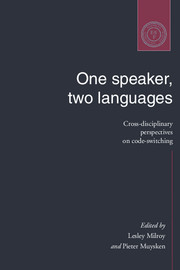Book contents
- Frontmatter
- Contents
- Notes on contributors
- Acknowledgments
- 1 Introduction: code-switching and bilingualism research
- Part one Code-switching in institutional and community settings
- Part two Code-switching and social life
- 6 The pragmatics of code-switching: a sequential approach
- 7 A social network approach to code-switching: the example of a bilingual community in Britain
- 8 Code-switching and the politics of language
- Part three Grammatical constraints on code-switching
- Part four Code-switching in bilingual development and processing
- Index
8 - Code-switching and the politics of language
Published online by Cambridge University Press: 05 June 2012
- Frontmatter
- Contents
- Notes on contributors
- Acknowledgments
- 1 Introduction: code-switching and bilingualism research
- Part one Code-switching in institutional and community settings
- Part two Code-switching and social life
- 6 The pragmatics of code-switching: a sequential approach
- 7 A social network approach to code-switching: the example of a bilingual community in Britain
- 8 Code-switching and the politics of language
- Part three Grammatical constraints on code-switching
- Part four Code-switching in bilingual development and processing
- Index
Summary
It's not always how you play the game, it's how you use the rules
Introduction
In 1977, the government of the province of Quebec passed Bill 101, a law to affirm and support French as the official and dominant language of the province. This law was a key element in Francophones' strategy to overcome two centuries of domination by English-speakers, and it touched on many domains, notably government, education and the workplace. Among other things, it required practitioners of certain professions (such as pharmacy, nursing, engineering) to demonstrate adequate knowledge of French in order to be licensed to practice. For some, this meant passing tests of French proficiency created and administered by the government.
In 1978, an English-speaking gentleman arrived at the office where these tests were administered and presented himself at the front desk, where the receptionist was chatting in French with a co-worker. He asked the receptionist, ‘Could you tell me where the French test is?’ The receptionist responded in French, ‘Pardon?’ The man repeated his request in English, ‘Could you tell me where the French test is?’ The receptionist asked, ‘En français?’ The man replied, ‘I have the right to be addressed in English by the government of Quebec according to Bill 101.’ The receptionist turned to her colleague and asked, ‘Qu'est-ce qu'il dit?’ (‘What's he saying?’). In the end, both parties won: the man got his information without having to speak French, and the receptionist was able to show him the right direction without having to speak English.
- Type
- Chapter
- Information
- One Speaker, Two LanguagesCross-Disciplinary Perspectives on Code-Switching, pp. 158 - 174Publisher: Cambridge University PressPrint publication year: 1995
- 71
- Cited by



